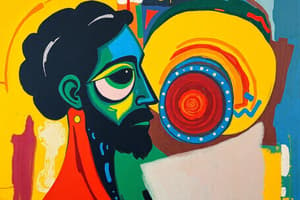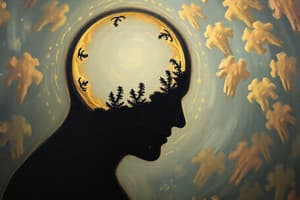Podcast
Questions and Answers
What does philosophy literally mean?
What does philosophy literally mean?
- Study of knowledge
- Reflection on existence
- Love of wisdom (correct)
- Pursuit of happiness
According to Plato, what is the nature of the soul?
According to Plato, what is the nature of the soul?
- Immortal and perfect (correct)
- Nonexistent after death
- Dependent on the body
- Temporary and changeable
How did Aristotle define the relationship between the body and soul?
How did Aristotle define the relationship between the body and soul?
- The body is superior to the soul
- They are completely separate entities
- The soul controls the body
- The body and soul are one (correct)
What concept did John Locke contribute to the understanding of the self?
What concept did John Locke contribute to the understanding of the self?
Which philosopher believed that knowledge comes from seeing the truth within ourselves?
Which philosopher believed that knowledge comes from seeing the truth within ourselves?
What was Descartes' famous philosophical statement?
What was Descartes' famous philosophical statement?
Which part of Freud's theory is characterized as the pleasure principle?
Which part of Freud's theory is characterized as the pleasure principle?
According to Gilbert Ryle, how is the self defined?
According to Gilbert Ryle, how is the self defined?
Which of the following is NOT one of the four steps in observational learning?
Which of the following is NOT one of the four steps in observational learning?
What does the term 'Anicca' refer to in Buddhism?
What does the term 'Anicca' refer to in Buddhism?
Which archetype represents the public persona in Jung's personality archetypes?
Which archetype represents the public persona in Jung's personality archetypes?
In what way do Eastern thoughts typically differ from Western thoughts?
In what way do Eastern thoughts typically differ from Western thoughts?
Which of the following is one of the five parts that compose the individual according to Buddhism?
Which of the following is one of the five parts that compose the individual according to Buddhism?
What concept describes the self as a subject focused on self-expression and is considered quite constant?
What concept describes the self as a subject focused on self-expression and is considered quite constant?
Which of the following stages in the development of self involves the use of symbols, gestures, and sounds?
Which of the following stages in the development of self involves the use of symbols, gestures, and sounds?
Who introduced the concept of the 'Looking Glass Theory' which suggests that one's self-perception is influenced by the perceptions of others?
Who introduced the concept of the 'Looking Glass Theory' which suggests that one's self-perception is influenced by the perceptions of others?
What term refers to the people who are significant to an individual because of their importance in the individual's life?
What term refers to the people who are significant to an individual because of their importance in the individual's life?
What is the term for the tangible material from previous generations as a component of culture?
What is the term for the tangible material from previous generations as a component of culture?
What type of cultural change involves society borrowing elements from other cultures?
What type of cultural change involves society borrowing elements from other cultures?
What is the primary function of the false self?
What is the primary function of the false self?
In the psychological perspective, what does William James categorize as the empirical self?
In the psychological perspective, what does William James categorize as the empirical self?
What defines the more pressing norms that are essential for the welfare of society?
What defines the more pressing norms that are essential for the welfare of society?
Which structure of personality is primarily associated with moral conscience and judgment?
Which structure of personality is primarily associated with moral conscience and judgment?
What phase of Freud's psychosexual stages focuses on developing mature sexual intimacy?
What phase of Freud's psychosexual stages focuses on developing mature sexual intimacy?
According to Carl Rogers, which aspect of self-concept represents the ideal person one wishes to become?
According to Carl Rogers, which aspect of self-concept represents the ideal person one wishes to become?
Which of the following best describes rationalization as a psychological defense mechanism?
Which of the following best describes rationalization as a psychological defense mechanism?
What does Albert Bandura's concept of 'self-reactiveness' refer to?
What does Albert Bandura's concept of 'self-reactiveness' refer to?
During which psychosexual stage is the focus on toilet training?
During which psychosexual stage is the focus on toilet training?
What is an example of the defense mechanism known as projection?
What is an example of the defense mechanism known as projection?
Flashcards are hidden until you start studying
Study Notes
Philosophical Perspective of the Self
- Philosophy combines the Greek words "philo" (love) and "sophia" (wisdom), meaning love of wisdom.
- Pythagoras was the first to use the term philosophy.
- Socrates emphasized the importance of self-examination, famously stating, "An unexamined life is not worth living," asserting dualism between the changeable body and the immortal soul.
- Plato declared that "the soul is immortal," dividing it into three parts: rational (thinking), spirited (emotions), and appetitive (biological needs).
- Aristotle defined the soul as the essence of the self, classifying it into three types: vegetative (plants), sentient (animals), and rational (humans).
- St. Augustine believed that knowledge comes from seeing the truth within oneself and that the soul completes the body.
- René Descartes coined "Cogito ergo sum" (I think, therefore I am), proposing body-mind dualism.
- John Locke viewed the self as consciousness, describing the mind at birth as a "tabula rasa" or blank slate.
- Immanuel Kant asserted that the self constructs its reality to create familiar experiences.
- Gilbert Ryle claimed that the self manifests through behavior, encapsulated in "I act therefore I am."
- Paul Churchland reduced the self to the brain, denying the existence of the mind as separate from the brain.
- Maurice Merleau-Ponty focused on "embodied subjectivity," stating knowledge comes from subjective experience.
- Sigmund Freud introduced Psychoanalytic Theory, outlining the conscious, preconscious, and unconscious levels of the mind, alongside the Id, Ego, and Superego models.
Social Perspective
- Sociology studies groups, social interactions, and societies.
- Personality refers to individual behavioral uniqueness.
- Socialization teaches individuals essential societal skills.
- Charles Horton Cooley's "Looking Glass Theory" suggests that our self-concept is influenced by how others perceive us.
- George Herbert Mead introduced the dual nature of self: I-self (subjective) and Me-self (object), describing self-development in three stages: preparatory (symbol use), play (role-taking), and game (understanding broader perspectives).
- Erving Goffman's theory of front stage and back stage describes public and private selves.
Anthropological Perspective
- Anthropology studies human behavior and culture (Anthropos = man; Logos = study).
- Culture comprises material components (tangible items), cognitive components (beliefs, knowledge), and normative components (social norms, folkways, mores).
- Cultural change can occur through cultural lag (disparity between social progress and cultural beliefs) and cultural borrowing (adopting elements from other cultures).
- Socialization helps individuals adapt to group norms and behaviors through agents like family, school, religion, and media.
Psychological Perspective
- William James identified the I-self (who we are) and Me-self (empirical self) composed of material, social, and spiritual dimensions.
- David Lester discussed the concept of multiple vs. unified selves across roles and relationships.
- Donald Winnicott differentiated between true and false selves, where false selves protect the true self.
- Carl Rogers emphasized human goodness, free will, and psychological growth through self-concept, self-image, and self-esteem.
- Freud's structures of personality include the Id (pleasure principle), Ego (reality principle), and Superego (moral conscience), along with psychosexual stages defining childhood development.
- Psychological defense mechanisms include denial, repression, rationalization, and projection, among others.
- Albert Bandura highlighted human agency and proactive behaviors through intentionality, forethought, self-reactiveness, and self-reflectiveness.
- Carl Jung introduced personality archetypes such as Persona (public self), Shadow (dark self), Anima (feminine aspect), and Animus (masculine aspect), with Self as the central archetype.
Western vs. Eastern Perspective
- Western thought emphasizes scientific investigation and individualism.
- Eastern thought questions human life’s ultimate meaning, focusing on the self through various philosophies.
- Buddhism posits that self and soul are illusions; individuals consist of five parts: matter, sensation, perception, mental constructs, and consciousness, emphasizing impermanence (Anicca).
- Hinduism introduces the concept of Atman and the law of karma.
- Confucianism emphasizes ethical behavior and self-cultivation principles.
- Taoism views the self as a cosmic extension rather than a social construct.
Studying That Suits You
Use AI to generate personalized quizzes and flashcards to suit your learning preferences.




